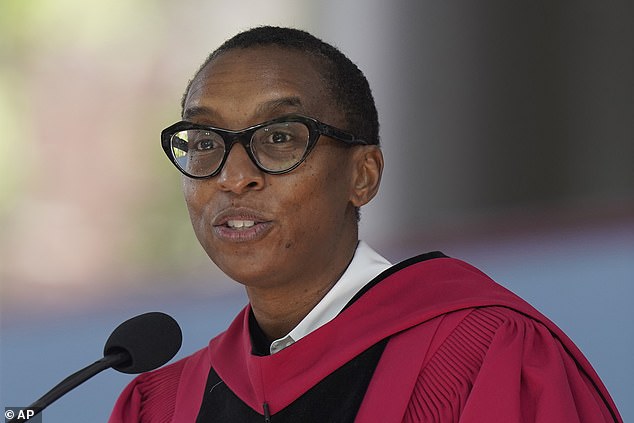Harvard’s woes deepen: Pro-Palestine students complain college is failing to protect them from racist attacks a month after Jewish students complained Ivy League school is now ‘bastion of rampant anti-Jewish hatred’
A group of pro-Palestinian Harvard students have filed a civil rights complaint alleging that the school’s leadership has failed to protect them from “rampant harassment and racist attacks, including doxxing, stalking and assault.”
The latest headache for the Ivy League school’s leadership comes as one of its biggest donors, billionaire Ken Griffin, announced he had ended his funding for the school in the wake of recent scandals.
Griffin, who started trading in his Harvard dorm room before becoming the most profitable hedge fund manager ever, told an audience at the Managed Funds Association conference in Miami on Tuesday that he was stopping donations for now.
“No… And I made that clear to the members of the board of directors,” Griffin said when asked if he still supported his alma mater financially.
In addition to the new complaint, Harvard remains under investigation by the Department of Education over allegations that it has become a “stronghold of rampant anti-Jewish hatred and intimidation” in the wake of Hamas’ brutal attack on Israel on October 7.
Billionaire investor Ken Griffin has decided to suspend his donations to Harvard over the school’s handling of anti-Semitism on campus during the war between Israel and Hamas

Accusations of a soft stance on anti-Semitism, along with accusations of plagiarism, led to the resignation of Harvard President Claudine Gay in January.

“Students at Harvard have been the targets of rampant harassment and racist attacks, including doxxing, stalking, and assault, simply because they are Palestinian, Muslims, and supporters of Palestinian rights,” the new complaint alleges.
That scandal, along with allegations of plagiarism, led to the resignation of the school’s first black female president, Claudine Gay, in January.
An attorney representing the pro-Palestinian students, Christina A. Jump, told the Harvard Crimson this week that she has been told stories of “harassment, discrimination and intimidation on the basis of being Palestinian, Muslim or Arab, and that they are seen as such. or are allies of their Palestinian fellow students.’
Jump heads the civil litigation division of the Muslim Legal Fund of America.
“For months, students at Harvard have been the target of rampant harassment and racist attacks, including doxxing, stalking, and assault, simply because they are Palestinian, Muslims, and supporters of Palestinian rights,” reads a statement on the MLFA website.
“Some have been attacked simply because they were wearing keffiyehs – traditional Palestinian scarves – and objects were thrown or poured on them on campus. Others have been stalked while working at their student jobs on campus.”
“Many suffered repeated doxxing and threats, even those who did nothing to expose themselves,” the report continues.
That statement describes the treatment of a student as “shocking, terrifying and outrageous.”
“We have been chased, spit on, stalked and hunted by doxxing trucks on campus, and even in our families’ homes. In addition to worrying about the safety of my family in Palestine, I also live in fear of being attacked while walking to class. No student should have to live like this,” the student alleged.
Griffin made headlines in April 2023 by donating $300 million to Harvard’s Faculty of Arts and Sciences, bringing the total amount of his gifts to more than half a billion.
Months later, students and alumni criticized Claudine Gay, who was named Harvard’s first Black president in 2023, for her handling of demonstrations over the Israel-Hamas conflict and her testimony before Congress on the crisis. Accusations of plagiarism also mounted and Gay resigned earlier this month.
While other alumni, including hedge fund manager Bill Ackman, who has donated about $50 million to Harvard, publicly called for Gay’s removal, Griffin had made no public comments about Harvard before Tuesday.
“Until Harvard makes it very clear that they are going to resume their role of training young American men and women to be leaders, to be problem solvers, to tackle tough issues, I am not interested in supporting the institution,” Griffin said. said.
He left the door open to resume his gifts, but made it clear that changes need to be made in the way the school pursues its mission.
Speaking more generally about America’s elite universities, Griffin said: “The real question is whether they will return to their roots of educating America’s children and young adults to become our country’s future leaders, or will they remain lost.” to go. in the wilderness of microaggressions, a DEI (diversity, equity, and inclusion) agenda that seems to have no real endgame, and is simply lost in the wilderness?”
Griffin’s Citadel invests $56 billion. In 2022, the company posted annual profits of $16 billion, making it the most successful hedge fund of all time, according to LCH Investments.
Harvard is the richest university in the United States with an endowment of $50.7 billion, but alumni like Ackman have accused the university of mismanaging its assets.
Griffin’s stance now suggests other megadonors may also slow or stop their donations, while student tuition hovers around $80,000 a year and critics say the cost is becoming prohibitive.
Just last week, Harvard shed new light on its ongoing investigation into plagiarism allegations against former President Claudine Gay, including an independent body recommending a broader review after substantiating some of the complaints.
In a letter Friday to a congressional committee, Harvard said it learned of the plagiarism allegations against Gay on Oct. 24 from a New York Post reporter.
The school contacted several authors Gay is accused of plagiarizing, and none objected to her language, the school said.
Harvard subsequently appointed the independent body, which focused on two articles by Gay published in 2012 and 2017. It concluded that they are “both sophisticated and original” and found “virtually no evidence of deliberately claiming findings” that were not its own.
However, the panel concluded that nine of the 25 allegations found by the Post were “of primary concern” and “paraphrased or reproduced the language of others without quotation marks and without sufficient and clear attribution.”
It also found one instance where ‘snippets of double-speak and paraphrasing’ by Gay could be interpreted as her taking credit for the work of another academic, although there is no evidence whatsoever that this was her intention.
